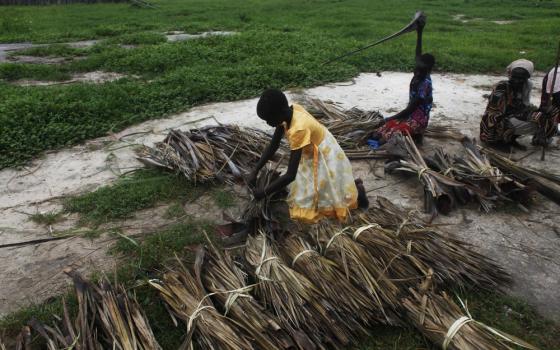With other conflicts making the news across the globe, not much is visible in the headlines from South Sudan, though unrest continues to create dire needs for the vulnerable there. In the last two days several news reports have surfaced about fears of famine for the people of South Sudan. In particular, an article appearing in CBC – Radio Canada reports that looting, poor weather conditions and continued fighting have made efforts difficult to bring aid and supplies to the country, especially in the northern states.
LaSallian Br. Bill Firman, executive director of Solidarity with South Sudan, has written several letters over the past six months with information about the situation, sometimes providing hope that peace may come and other times honestly sharing his concerns of a broken nation. Recently, in his letters, he has turned attention toward those who are serving in South Sudan, attempting to work with South Sudanese people to bring a more stable life there and relieve suffering.
Firman wrote on July 12, acknowledging fear that South Sudan could become a failing state, “Solidarity with South Sudan has 32 religious sisters, brothers and priests and a couple of lay people, from various countries living and working in South Sudan. So why are they there? While on home leave, I saw a television commercial which, in my mind, points to the reason. The commercial ended with a person making the enigmatic statement: ‘A ship in the harbor is safe, but that’s not what ships are for.’”
Later in the letter Firman wrote, “When the early Comboni missionaries went to Africa, they knew that most of the earlier African missionaries had died from malaria and other diseases. It was more dangerous then. But they went and they were very successful in establishing the church in South Sudan. The Combonis today continue their own ministries in South Sudan but are also part of Solidarity with South Sudan. There is great strength in working together as the religious congregations are doing in South Sudan. We are there because that is what we are for.”
In May, men and women religious serving in South Sudan came together to talk about evangelization and hope for South Sudan. Calling themselves the 75 representatives of 29 Catholic Religious Congregations belonging to the Religious Superiors’ Association of South Sudan (RSASS), they issued a statement titled, “A message of solidarity, peace and hope to the people of South Sudan.”
Just as Firman wrote in his letter, the sense of purpose in living in solidarity with those in South Sudan is present in these religious women and men, too. The communicated in their statement, “We men and women of Consecrated Life in the Catholic church of South Sudan reiterate our full collaboration, in communion with the local churches and other stakeholders, with the national healing process so that justice, peace and true reconciliation may be established in South Sudan. We will continue to serve the people of this young nation in a spirit of solidarity, joy and with hope for a better future.”
As South Sudan continues to fade from the global news spotlight and faces the reality of a fragile and possibly failing state, the stories of what these men and women religious are doing there are not likely to be told. However, their work is the truest sense of what it means to be a mission church and a global example for empowering others.
[Colleen Dunne is development director for De La Salle Blackfeet School in Browning, Montana, and a former NCR Bertelsen intern in editorial and marketing.]

